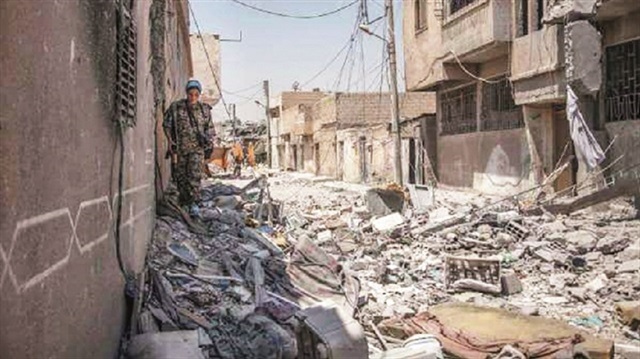

File photo
The U.S.’s final goal in establishing this terror corridor is seizing Idlib through the PKK-occupied Afrin, and, as such it will secure control over the entire border regions and monopolize control over Syria’s potential energy resources
The U.S. is preparing to advance on Syria’s Deir ez-Zor, which is next in line to become another city destroyed for the sake of seizing control over the region’s oil reserves which, according to Pentagon plans, will be marketed through the Iraq-Mediterranean route after handing over control to the Kurdistan Workers’ Party (PKK) terrorists in the region.
The target is Afrin- Idlib
By seizing control over Deir ez-Zor and handing over control over Hasakah and Raqqa’s energy routes to the PKK, the U.S. is in the final stages of shaping the “federal” structure on Turkey’s southern border, which is comprised of three regions and six cantons.
The U.S.’s final goal in establishing this terror corridor is seizing Idlib through the PKK-occupied Afrin, and, as such it will secure control over the entire border regions and monopolize control over Syria’s potential energy resources through its colonial delegates, and reach the Mediterranean, which enables it to market oil produced in the regions under its occupation.
“The PKK is our only partner”
U.S. General Townsend has signaled his country’s desire to control the route that stretches 250 kilometers by seizing Deir ez-Zor, which sits atop Syria’s largest oil reserves.
After taking control of Deir ez-Zor , along with the middle Euphrates regions of Manbij and Raqqa, the U.S stated that PKK terrorists will be the only reigning force in Syria’s east: “PKK/PYD are our only partners in this operation,” according to U.S. General Stephen Townsend.
The U.S. has also established several terror camps in the region, such as the ones set up in Qamishli, Tal Abyad, Ain al-Arab, Tabka, Manbij, and the larger and recently-operational PKK terror camp in the city of al-Shaddadi, called “The Military Academy.”
The PKK is listed as a terrorist organization by Turkey, the European Union and the United States.
The PKK has been conducting armed violence in the southeastern part of Turkey since 1984. More than 40,000 people, mostly civilians, have been killed in the three-decade long conflict.

Gathering clients
The U.S. has summoned oil companies to the PKK-occupied Syrian north to market the region’s oil resources. During the months of June and August, representatives of French, Canadian, American and English oil companies, accompanied by Special Presidential Envoy for the Global Coalition to Counter Daesh Brett Mcgurk, have made two separate visits to the PKK-occupied cities of Raqqa and Hasakah, where they met with tribe representatives and carried out secret meetings with so-called “canton administrators.”
By establishing control over the Raqqa-Deir ez-Zor- Hasakah axis, which stretches from the Iraqi border, the U.S. is set to make millions of dollars through producing and exporting oil from Syria through the Mediterranean route. By selling oil to the regime in Damascus, Daesh and PYD terrorists receive a daily income of 6- 7 million dollars.

Fighting could escalate in Deir ez-Zor
As the U.S.-PKK alliance advances towards Deir ez-Zor from the north, Iranian-backed Assad forces are quickly gaining ground west of the city.
Following gains in Homs and after reaching a deal with Daesh terrorists in Qalamoun, regime forces are now stationed 30 kilometers from Deir ez-Zor, where they control three districts in the city center.
A potential clash between U.S-backed PKK terrorists and Russian and Iranian-backed Assad forces in oil-rich Deir ez-Zor is expected, according to local sources.
#Syria
#US
#Oil
#Deir Ezzor
#PKK






